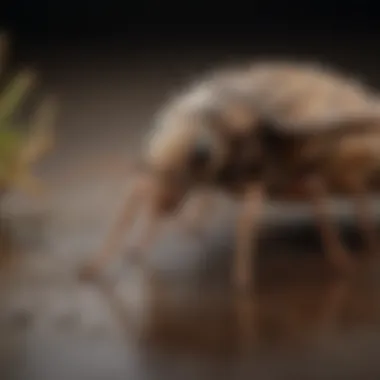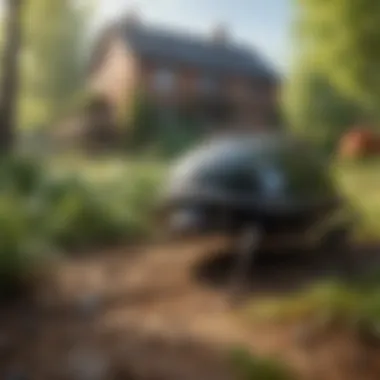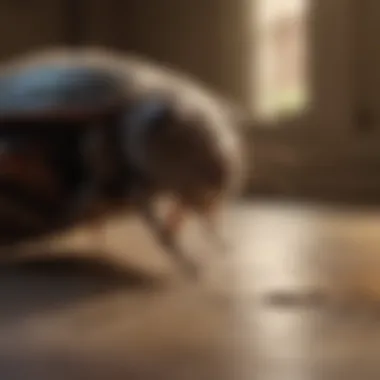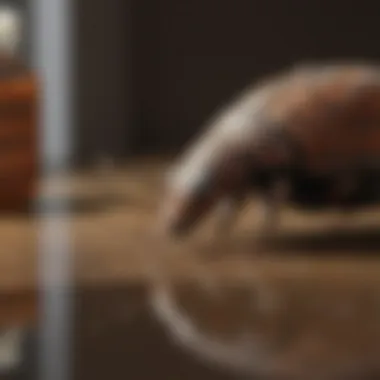Effective Pest Control Strategies in Bloomsburg


Intro
Pest control is a vital topic for homeowners in Bloomsburg, Pennsylvania. In a region where the balance between nature and urban living often leads to encounters with various pests, understanding these creatures can significantly aid in maintaining a comfortable living environment. This guide will explore the key aspects of pest management, including how to identify common household pests, methods to prevent infestations, and practical solutions for dealing with these unwanted visitors.
Pest Identification
Common Household Pests
In Bloomsburg, several pests can create problems for residents. Among the notable species are:
- Ants: These small insects can invade homes in search of food. They often travel in trails and are drawn to sugary substances.
- Roaches: German cockroaches are common in urban settings and can breed quickly, leading to large infestations.
- Termites: These wood-destroying insects often go unnoticed until significant damage has occurred. They thrive in damp environments and can cause substantial structural damage.
- Bed Bugs: These nocturnal pests are notorious for infesting bedding and can lead to uncomfortable bites.
- Rodents: Mice and rats are common in homes, searching for food and shelter, and can transmit diseases.
Signs of Infestation
Recognizing the signs of a pest infestation early can prevent larger problems. Key indicators include:
- Droppings: Finding droppings in common areas can indicate the presence of rodents or insects.
- Nesting Materials: The presence of shredded paper, fabric, or other materials can suggest nesting activity.
- Gnaw Marks: Damaged items or structures can reveal the activity of pests such as rodents.
- Hollow Sounds: When knocking on wood, a hollow sound may suggest termite activity.
- Live or Dead Insects: The sighting of live pests or discarded exoskeletons can indicate an infestation.
Prevention Methods
Environmental Modifications
Making changes in the environment can significantly reduce the likelihood of pest infestations. Consider the following modifications:
- Seal Entry Points: Close any gaps or openings in walls, around windows, and doors to prevent pests from entering.
- Manage Yard Debris: Keep the yard tidy and remove any organic debris where pests can thrive.
- Proper Drainage: Ensure that water doesn't pool around the foundation of your home, as it attracts insects.
Home Maintenance Tips
Regular maintenance can assist in a pest-free home. Some effective strategies include:
- Regular Cleaning: Frequent vacuuming and dusting can eliminate food sources and nesting materials.
- Food Storage: Store food in airtight containers and promptly clean spills to avoid attracting pests.
- Moisture Control: Use dehumidifiers in damp areas and fix leaks immediately to deter pests.
DIY Pest Control Solutions
Natural Remedies
Many homeowners prefer eco-friendly, natural remedies for pest control. Consider applying:
- Vinegar Solutions: A mixture of vinegar and water can deter ants and other pests from entering homes.
- Essential Oils: Oils like peppermint and tea tree can repel various insects when sprayed around the house.
- Boric Acid: While maintaining safety protocols, boric acid can be used against roaches and ants.
DIY Traps and Barriers
Creating traps can effectively control pest populations. Simple methods include:
- Homemade Ant Traps: Combine sugar and borax to attract and kill ants.
- Glue Traps for Rodents: Set out glue traps in areas where rodent activity has been noticed.
- Physical Barriers: Use mesh screens and door sweeps to block pest entry.
Keeping in mind that long-term solutions often require a multifaceted approach, addressing both prevention and eradication methods is key. Effective pest control is not just about extermination; it's about creating an environment that is inhospitable to pests.
This guide aims to provide practical and effective strategies for residents of Bloomsburg, allowing them to manage pests more effectively in their homes.
Understanding Pest Control
Pest control is not just about eliminating unwanted insects or rodents. It plays a vital role in maintaining health, comfort, and property value for homeoweners in Bloomsburg, Pennsylvania. Effective pest management combines the understanding of pest behavior, the environment, and the appropriate methods for control. This section covers the essential aspects of pest control, including its definition, importance, and common myths that often cloud the understanding of effective practices.
Definition and Importance
Pest control refers to the regulation or management of a species defined as a pest, a nuisance to human beings or their interests, which may be the health of the ecosystem. Pests can include insects, rodents, and even larger animals. Understanding what a pest is can greatly influence how one may approach the control of them. Notably, pest control is crucial for several reasons:


- Health Protection: Pests can carry diseases. For example, rodents can transmit hantavirus or salmonella through their droppings and urine. Similarly, some insects can pass on harmful bacteria that affect human health.
- Property Preservation: Infestations can cause serious damage to structures and belongings. Termites can significantly compromise the integrity of a home.
- Psychological Comfort: Living in a pest-free home contributes to the overall mental well-being of the residents. Knowing that pests are under control can grant peace of mind.
- Economic Factors: The cost of pest infestation repairs can be substantial. Preventing infestations can save homeowners from future financial burdens.
In the context of Bloomsburg, being proactive with pest control can prevent larger scale infestations that may impact multiple homes. Therefore, understanding pest control goes beyond just a reactionary measure; it is preventative in nature.
Common Myths and Misconceptions
Many myths surround the realm of pest control, leading to misconceptions that can hinder effective management. Addressing these myths is important for the proper understanding of pest control:
- All Pests Are Bad: Not all pests are harmful. Some insects, such as bees, play essential roles in pollination and are crucial to the ecosystem.
- DIY Solutions Are Always Effective: While some home remedies can assist in pest control, they may not be effective for severe infestations. Professional services often use targeted treatments that home remedies fail to address.
- Pests Only Occur in Dirty Homes: Pests can invade clean environments just as easily. They often search for food and shelter, which can be found in any household.
- Insecticides Are Harmless: Many people assume that all pesticides are safe once they dry. However, they can pose risks to both human health and the environment if not handled properly.
Effective pest control combines knowledge about the pest with appropriate elimination strategies. Just asimportant as acting against pests is understanding their nature and our environment.
Pest Species in Bloomsburg
Understanding the types of pests prevalent in Bloomsburg is essential for effective pest control. Local pest species can cause substantial damage not only to homes and gardens but also to the health of residents. By identifying these pests, homeowners can take quick action to mitigate their impacts. Awareness of local pest species also helps in choosing effective prevention strategies and pest management techniques.
Identifying Local Pests
A few common pests in Bloomsburg include ants, roaches, rodents, and termites. These insects and animals vary in their behavior and habitat, making it important to know how to identify them. For instance, ants typically build nests in soil or wood, while roaches are often found in dark, damp spaces. Rodents, like mice and rats, tend to invade homes in search of food, while termites can remain hidden within wood structures, only becoming noticeable when their damage is extensive.
To properly identify these pests, look out for signs like droppings, shed skin, or even nesting materials. By knowing what to look for, residents can understand when there is a threat and act quickly to address it.
Common Infestations and Their Impact
Infestations can lead to significant problems in homes. Ant infestations can compromise food safety and lead to potential health risks. Similarly, roach infestations are notorious for spreading allergens and diseases. Rodents, aside from contaminating food, can also cause electrical hazards by chewing on wires. Termites pose a different type of threat, silently eroding the structural integrity of wooden structures, leading to costly repairs.
Understanding the potential consequences of these infestations is crucial. The longer an infestation persists without addressing it, the greater the risk of damage or health concerns.
Seasonal Pest Activity
Pest activity can fluctuate with the seasons. In Bloomsburg, spring often marks the beginning of increased pest activity as warmer temperatures encourage breeding. For example, ants frequently become more visible as they leave their nests to forage. In contrast, rodent activity might peak in the fall as they seek warmth and food sources before winter.
Being aware of these seasonal patterns helps homeowners anticipate pest issues. For instance, preparing outdoor spaces in early spring can curb pests before they become an issue. Furthermore, actions taken in one season can influence the next, thus diligence throughout the year is suggested for effective management.
Prevention Strategies
Preventive strategies are crucial in pest control. Ignoring this aspect often leads to larger infestations, which can be costly and stressful. Establishing effective prevention methods can significantly reduce the likelihood of pests invading your home. This section delves into essential preventive practices within Bloomsburg and emphasizes their importance.
Home Maintenance Tips
Regular home maintenance plays a pivotal role in pest prevention. Start by inspecting your property for any cracks or openings. Even small gaps can allow pests like ants or rodents to enter. Sealing these points with caulk or weather stripping can greatly diminish this risk.
Keep your home clean and clutter-free. Pests are attracted to food sources and hiding spots. Ensure food is stored in airtight containers and dispose of garbage regularly. Washing dishes promptly and cleaning up spills can also help minimize pest attraction.
Furthermore, ensure your home is dry. Moisture can attract many pests, including termites and cockroaches. Fix any leaks and use dehumidifiers in damp areas like basements.
Landscaping and Outdoor Practices
Your yard also requires attention in pest management. Regularly trimming bushes and trees near your home reduces potential shelters for pests. It is ideal to keep them at least 18 inches away from the building.
Consider the types of plants in your garden. Some plants act as natural repellents, such as marigolds and lavender. Besides being beautiful, these can deter pests from approaching your home. Also, be cautious with standing water. It is a breeding ground for mosquitoes and other pests. Ensure proper drainage in your yard and regularly check for any accumulated water.
Setting Up Barriers
Implementing physical barriers can also be an effective strategy. Installing screens on windows and doors prevents insects from entering while allowing ventilation. Ensure these screens are free of holes or tears.
Fencing can provide an additional layer of protection. For instance, underground fencing inhibits burrowing pests like groundhogs or rabbits. Ensure the fence extends several inches into the ground to deter these animals.
Moreover, consider mulch alternatives. Some gardeners prefer using gravel, as it is less attractive to pests compared to traditional mulch. This is particularly helpful in managing termites.


Regularly maintaining your property and implementing these strategies can significantly reduce pest threats in Bloomsburg, providing a more comfortable living environment.
DIY Pest Control Solutions
The approach to pest control has evolved over years. Many homeowners in Bloomsburg seek ways to manage pests themselves. DIY pest control solutions not only save money but can also provide immediate relief. Understanding how to handle pest issues on your own empowers individuals and promotes a sense of practicality.
Natural Remedies
Natural remedies play a significant role in DIY pest control. These solutions are ideal for those looking to avoid harsh chemicals. Some popular natural remedies include:
- Diatomaceous Earth: This powder is non-toxic to humans and pets but deadly to insects.
- Soap Sprays: A mixture of water and mild soap can effectively eliminate soft-bodied insects.
- Vinegar: Its strong scent deters certain pests, particularly ants and spiders.
Homeowners should be aware that while natural remedies are safer, they may not always provide immediate results. Repeated applications might be necessary to achieve desired effects. Also, individual effectiveness can vary based on the pest species.
Commercial Products
Commercial pest control products have their place in DIY treatments. These include insecticides, traps, and moisture absorbers. When selecting commercial products, homeowners should consider:
- Target Species: Ensure the product is designed for the specific pest in question.
- Application Method: Some products are easier to apply than others. Be mindful of ease and safety.
- Active Ingredients: Be aware of what chemicals are present, as some can be harmful to pets or children.
Product recommendations include Ortho Home Defense and Raid Ant & Roach Killer. Always follow label directions for effective and safe use.
Integrated Pest Management Techniques
Integrated Pest Management, or IPM, is a holistic approach combining multiple strategies. This method is more sustainable and often more effective than solo solutions. Key components of IPM include:
- Identification: Knowing what pests are present is crucial. Different pests have varied characteristics and habits.
- Monitoring: Regular checks can help catch infestations early. Use traps or visual inspections to monitor pest activity.
- Prevention: Eliminate potential entry points and breeding sites. This might involve sealing gaps and proper waste disposal.
- Control Measures: Combine natural remedies, commercial products, and cultural practices. This reduces reliance on any one method.
"IPM emphasizes understanding pest lifecycles. This knowledge helps in selecting the right combination of control methods."
A successful DIY pest control strategy hinges on informed actions and persistent effort. For housewives and homeowners, understanding these methods fosters greater control over their living environments.
When to Seek Professional Help
Understanding when to seek professional pest control assistance is crucial for homeowners in Bloomsburg, Pennsylvania. While there are many DIY methods available, certain situations indicate that it is better to rely on the expertise of trained professionals. Ignoring these situations can lead to worsening infestations, increased damage, and potential health risks.
Signs of Severe Infestation
Several signs hint at a severe pest problem that may require professional intervention. Homeowners should be on the lookout for:
- Visible pest activity: Frequent sightings of pests such as rodents, roaches, or widespread insect activity can indicate a larger issue.
- Damage to property: Signs like gnawed wires, chewed house materials, or droppings suggest pests are causing significant harm.
- Unusual odors: Unpleasant smells often hint at pest infestations, particularly with rodents or decomposing insects.
- Allergies or health Issues: More residents are suffering allergic reactions, it may signal a higher pest presence.
Recognizing these indicators early can prevent severe complications and address pest issues before they escalate.
Choosing the Right Pest Control Service
When engaging a pest control service, it is essential to consider various factors to ensure the best fit. First, check the license and certifications of the service provider. In Pennsylvania, pest control professionals must hold appropriate licenses to operate legally.
Second, evaluate the company’s experience and reputation. Look for reviews online. Families often share their experiences on platforms like Reddit or Facebook, offering insights into a company’s reliability and service quality. Always ask for references and follow up with them.
Furthermore, inquire about the methods they use for pest management. Eco-friendly solutions are often preferred for families concerned about the environment and health. Ensure that the service provider discusses treatment plans thoroughly and explains their approach.
Understanding Treatment Plans
A comprehensive treatment plan is the cornerstone of effective pest control. Homeowners need to attain clarity on various aspects of the plan:
- Inspection: This initial step involves assessing the extent of the infestation and identifying the species involved. A detailed examination helps in devising a targeted solution.
- Treatment Options: Professionals should present various methods for eradication, ranging from chemical treatments to eco-friendly alternatives. Understanding these options allows homeowners to choose the method that aligns with their preferences and concerns.
- Follow-up Services: A good pest control provider will offer follow-up services to monitor the effectiveness of the treatment. This ensures that pests do not return after initial treatment.


By comprehending these components of a treatment plan, homeowners can make informed decisions about pest control methods. Adequate knowledge equips you with the confidence needed to tackle pest-related challenges effectively.
Legal and Regulatory Considerations
Understanding the legal and regulatory aspects of pest control is essential for homeowners in Bloomsburg. Compliance with local laws can prevent potential fines and ensure effective pest management. This section covers two critical elements: local legislation concerning pest control and the licensing of pest control professionals. By being aware of these regulations, residents can make informed decisions regarding pest management in their homes.
Local Legislation on Pest Control
In Pennsylvania, pest control is subject to specific local regulations designed to protect public health and the environment. Bloomsburg, like many towns in the state, has its own set of rules governing pest control practices. These laws usually address the safe application of pesticides, the responsibility of pest control companies, and the reporting of certain pest infestations.
Before executing any pest control strategy, it is vital to consult the municipal regulations. Residents should be aware of any restricted chemicals or methods of application. Furthermore, following these regulations helps in promoting a collaborative community effort towards effective pest management. Violating local laws can result in penalties, so staying informed is crucial.
Licensing of Pest Control Professionals
Choosing a licensed pest control professional is not just important; it is often a legal requirement. In Pennsylvania, pest control companies must hold valid licenses to operate. This ensures they meet the training and safety standards necessary for effective pest management. Licensing protects homeowners from unqualified or negligent pest control practices.
A licensed professional is knowledgeable in the safe handling of pesticides and the latest pest control techniques. Before hiring a pest control service, check if they are fully licensed and insured. Homeowners can contact local regulatory agencies to verify a company's credentials.
Before proceeding with any pest control service, ensure they follow all local regulations and employ licensed technicians. This approach guarantees not only compliance but also an increase in the effectiveness of the pest control efforts.
Sustainable Pest Management Practices
Sustainable pest management practices are essential in protecting both the environment and public health. These strategies emphasize long-term prevention and control of pests while reducing the reliance on chemical solutions. Homeowners in Bloomsburg, Pennsylvania, can greatly benefit from understanding and implementing these eco-friendly solutions. The significance of sustainable methods lies in their ability to minimize harmful impacts on non-target species, promote biodiversity, and protect the local ecosystem. Additionally, they often prove to be more cost-effective over time compared to traditional pest control methods.
Importance of Eco-Friendly Solutions
Eco-friendly pest control solutions offer numerous advantages. Firstly, they pose a lower risk to human health and the environment. Products such as neem oil or diatomaceous earth are less toxic while still effective against various pests. Here are a few key benefits of using eco-friendly options:
- Reduced Chemical Exposure: Homeowners limit their exposure to harmful chemicals that can affect health, especially for children and pets.
- Biodiversity Preservation: Natural solutions support a balanced ecosystem by not affecting beneficial insects like bees and ladybugs.
- Soil and Water Safety: Careful choice of pest control methods can prevent chemical runoff, keeping local water sources clean and safe.
The adoption of eco-friendly solutions aligns well with the growing awareness of environmental sustainability. Families that choose these strategies often find peace of mind knowing they are protecting their loved ones and creating a safer habitat.
Community Initiatives in Bloomsburg
Bloomsburg has seen a surge in community initiatives aimed at fostering sustainable pest management practices. Local organizations and local government agencies encourage residents to engage in proactive measures. These initiatives often include workshops that educate homeowners on pest identification, prevention techniques, and the implementation of eco-friendly solutions. Some noteworthy community actions include:
- Educational Programs: Workshops held at community centers or online platforms that provide knowledge on sustainable practices.
- Resource Sharing: Local groups may offer resources, including guides and tool lending libraries, to empower individuals.
- Collaboration with Environmental Groups: Partnerships with ecological organizations help increase awareness about the importance of pest management that supports the wider ecosystem.
By working together, residents of Bloomsburg can develop a more comprehensive approach to pest control that benefits their homes and the environment.
In summary, engaging with sustainable pest management not only contributes to effective pest control but also promotes a healthier community overall. Homeowners, through eco-friendly practices, can play an influential role in making Bloomsburg a more sustainable place to live.
Resources and Further Reading
Understanding pest control requires continuous learning and adaptation. The value of resources and further reading lies in their ability to inform and guide homeowners in Bloomsburg, Pennsylvania, especially as pest challenges evolve. This section underscores the pivotal role that educational materials and local support can play in ensuring effective pest management practices. By utilizing diverse resources, residents can better equip themselves with knowledge and tools necessary for both prevention and remediation of pest issues. Moreover, these resources foster community ties and encourage shared experiences, leading to overall improvement in pest control strategies.
Educational Materials on Pest Control
Educational materials serve as an invaluable tool for homeowners looking to understand pest dynamics in their surroundings. Numerous publications, websites, and video resources cater to individuals who might not have extensive knowledge of pest control. For instance, the Penn State Extension offers various guides that detail pest biology and management strategies, which can be found here.
Homeowners can also explore online platforms like Wikipedia and Britannica for foundational knowledge about specific pest species. These databases provide well-researched content that can deepen understanding of behaviors, lifecycles, and habitats of pests commonly found in Bloomsburg.
Additionally, social media groups and forums on platforms such as Reddit can provide peer-to-peer assistance. Engaging in discussions on pest control techniques allows individuals to learn from real-world experiences, which can often be more relatable than academic texts.
"Knowledge is power. Equip yourself with the right information to manage pests effectively in your home."
Local Agencies and Support Groups
Local agencies and support groups are essential components of a robust pest management framework. They not only provide expertise but also connect residents with reliable services. The Bloomsburg Area has several pest control companies that offer consultations and tailored solutions, which can be found through local directories or community boards.
Support groups, often found on social platforms, enable individuals to share their pest-related experiences and solutions. Engaging with these groups fosters a sense of community and collective problem-solving.
For professional assistance, organizations like the Pennsylvania Department of Agriculture offer resources and information about licensed pest control providers. These agencies ensure that services adhere to local regulations, promoting safe and effective pest management practices. Homeowners should seek guidance from such institutions to validate the credentials of pest control professionals, ensuring compliance with state laws.
These resources together enrich the knowledge base of homeowners, empowering them to act decisively when confronted with pest challenges.















